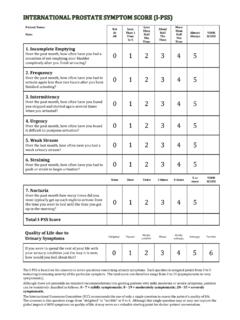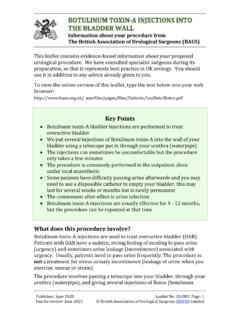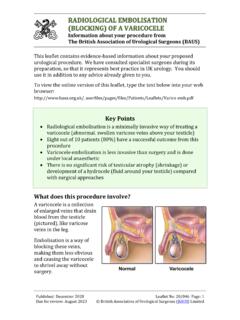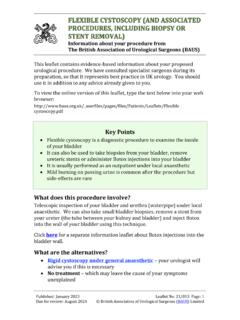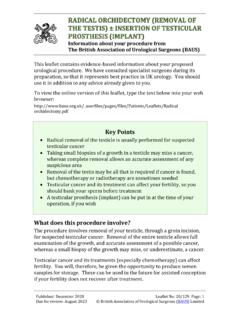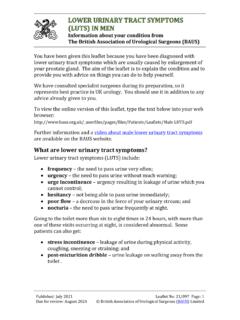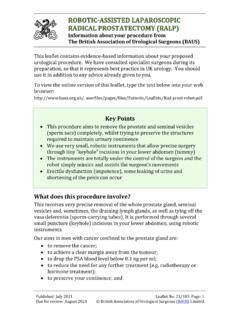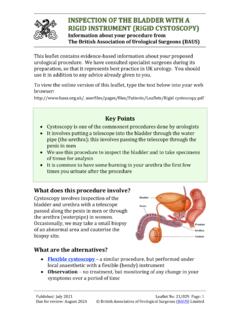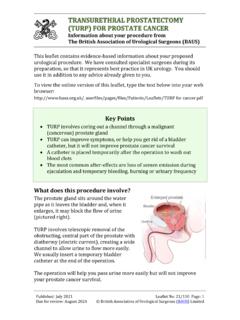Transcription of Transperineal Biopsies - BAUS
1 Information about your procedure from The British Association of Urological Surgeons (BAUS) Published: July 2021 Leaflet No: 21/107 Page: 1 Due for review: August 2024 British Association of Urological Surgeons (BAUS) Limited This leaflet contains evidence-based information about your proposed urological procedure. We have consulted specialist surgeons during its preparation, so that it represents best practice in UK urology. You should use it in addition to any advice already given to you. To view the online version of this leaflet, type the text below into your web browser: What does this procedure involve? Putting an ultrasound probe into your rectum (back passage) to scan your prostate. Guided by ultrasound, Biopsies are taken from your prostate through your perineum (the skin between your scrotum and rectum).
2 We usually perform it using local anaesthetic, as an outpatient procedure. Sometimes, we do it under a spinal or general anesthetic in theatre. You will often have an MRI scan first, to see if you need a biopsy , and to guide where we need to take samples from if Biopsies are needed. What are the alternatives? Observation with repeat blood tests repeating your blood tests and only investigating further if you PSA levels rise. Key Points Transperineal ultrasound-guided biopsy of your prostate is done to check for prostate cancer There is, at present, no more reliable way than Biopsies for checking your prostate The commonest side-effects are bleeding and reduced urinary flow, but infection is rare Many of the prostate cancers diagnosed are not life-threatening; they may require no active treatment, only careful monitoring Published: July 2021 Leaflet No: 21/107 Page: 2 Due for review: August 2024 British Association of Urological Surgeons (BAUS) Limited Transrectal ultrasound-guided prostatic Biopsies usually performed under local anaesthetic with a biopsy needle passed through the ultrasound probe What happens on the day of the procedure?
3 Your urologist (or a member of their team) will briefly review your history and medications, and will discuss the procedure again with you to confirm your consent. Generally, the procedure is performed under local anaesthetic. If, for any reason, it needs to be done under a general anaesthetic, an anaesthetist will see you to discuss the type of anaesthetic. He/she will also discuss pain relief after the procedure with you. If you have Biopsies performed under general or regional anaesthetic, we may provide you with a pair of TED stockings to wear. These help to prevent blood clots from developing and passing into your lungs. Your medical team will decide whether you need to continue these after you go home. Details of the procedure we normally carry out the procedure under local anaesthetic although sometimes a general or spinal anaesthetic may be necessary before the procedure, we may give you either an antibiotic tablet or an injection (depending on local infection control policy)
4 , after we have checked carefully for any allergies we position you in special supports which allow the surgeon to access the skin behind your scrotum we may use tape to move your scrotum out of the way we normally examine your prostate first, by rectal examination, before inserting the ultrasound probe we will use an antiseptic solution to clean your perineum if local anaesthetic is used, this may sting for a few seconds before the area becomes numb if the procedure is done under a general anaesthetic, we may put a catheter through your urethra (waterpipe) into your bladder before the procedure; this is removed on the day of surgery or the morning after the probe is as wide as a man s thumb and approximately 10 cm (four inches) long Published: July 2021 Leaflet No: 21/107 Page: 3 Due for review: August 2024 British Association of Urological Surgeons (BAUS) Limited to take Biopsies from the prostate, we may use a special grid so that all areas of the prostate can be included or use a special device that allows access through the skin to the prostate.
5 The biopsy needles are guided into position using the ultrasound scanner (pictured) we may get additional biopsy guidance by superimposing multiparametric MRI images on the ultrasound scans the number of Biopsies taken depends on your PSA level, the MRI report and other risk factors we may apply a dressing to your perineum which is held in place with a pair of disposable pants the procedure takes 30 to 45 minutes to complete you should expect to go home after couple of hours if the procedure is done under local anaesthetic, or within 24 hours if it is done under general anaesthetic Are there any after-effects? The possible after-effects and your risk of getting them are shown below. Some are self-limiting or reversible, but others are not. The impact of these after-effects can vary a lot from patient to patient; you should ask your surgeon s advice about the risks and their impact on you as an individual: After-effect Risk Blood in your urine for up to 10 days Almost all patients Blood in your semen which can last up to six weeks (this poses no risk to you or your sexual partner) Almost all patients Published: July 2021 Leaflet No: 21/107 Page: 4 Due for review: August 2024 British Association of Urological Surgeons (BAUS) Limited What is my risk of a hospital-acquired infection?
6 Your risk of getting an infection in hospital is between 4 this includes getting MRSA or a Clostridium difficile bowel infection. This figure is lower for a day-case admission but higher in a group of patients who have had: long-term drainage tubes ( catheters); Bruising in your perineal area Between 1 in 2 & 1 in 10 patients Discomfort in your prostate caused by bruising from the Biopsies Between 1 in 2 & 1 in 10 patients Temporary problems with erections caused by bruising from the Biopsies 1 in 20 patients (5%) Inability to pass urine (acute retention of urine) 1 in 20 patients (5%) Bleeding in your urine preventing you from passing urine (clot retention) 1 in 50 patients (2%) Failure to detect a significant cancer in your prostate Between 1 in 10 & 1 in 50 patients Need for a repeat procedure if Biopsies are inconclusive or your PSA level rises further Between 1 in 10 & 1 in 50 patients Bleeding in your urine requiring emergency admission for treatment 1 in 100 patients (1%)
7 Infection in your urine requiring antibiotics 1 in 100 patients (1%) Septicaemia (blood infection) requiring emergency admission for treatment Less than 1 in 100 patients (<1%) Published: July 2021 Leaflet No: 21/107 Page: 5 Due for review: August 2024 British Association of Urological Surgeons (BAUS) Limited long hospital stays; or multiple hospital admissions. What can I expect when I get home? you will get some blood in your urine which may last several days, often with the occasional blood clot we advise you to drink plenty of fluid to help stop this bleeding you often see blood in your semen for up to six weeks you will be given advice about your recovery at home you will be given a copy of your discharge summary if the procedure is performed under general anaesthetic and a copy will also be sent to your GP you may be given antibiotics.
8 Any other tablets you may need will be arranged & dispensed from the hospital pharmacy if the bleeding in your urine does not stop, you should contact your GP or specialist nurse for further advice if you are unable to pass urine at all, you should contact your GP immediately or go to your local Emergency Department we will review the results of your Biopsies in a multidisciplinary team (MDT) meeting within seven to 10 days we will let you and your GP know the results as soon as possible, and arrange an outpatient appointment for you to discuss what action is needed General information about surgical procedures Before your procedure Please tell a member of the medical team if you have: an implanted foreign body (stent, joint replacement, pacemaker, heart valve, blood vessel graft); a regular prescription for a blood thinning agent ( warfarin, aspirin, clopidogrel, rivaroxaban, dabigatran); a present or previous MRSA infection; or a high risk of variant-CJD ( if you have had a corneal transplant, a neurosurgical dural transplant or human growth hormone treatment).
9 Questions you may wish to ask If you wish to learn more about what will happen, you can find a list of suggested questions called "Having An Operation" on the website of the Royal College of Surgeons of England. You may also wish to ask your surgeon for his/her personal results and experience with this procedure. Published: July 2021 Leaflet No: 21/107 Page: 6 Due for review: August 2024 British Association of Urological Surgeons (BAUS) Limited Before you go home We will tell you how the procedure went and you should: make sure you understand what has been done; ask the surgeon if everything went as planned; let the staff know if you have any discomfort; ask what you can (and cannot) do at home; make sure you know what happens next; and ask when you can return to normal activities.
10 We will give you advice about what to look out for when you get home. Your surgeon or nurse will also give you details of who to contact, and how to contact them, in the event of problems. Smoking and surgery Ideally, we would prefer you to stop smoking before any procedure. Smoking can worsen some urological conditions and makes complications more likely after surgery. For advice on stopping, you can: contact your GP; access your local NHS Smoking Help Online; or ring the free NHS Smoking Helpline on 0300 123 1044. Driving after surgery It is your responsibility to make sure you are fit to drive after any surgical procedure. You only need to contact the DVLA if your ability to drive is likely to be affected for more than three months. If it is, you should check with your insurance company before driving again.
